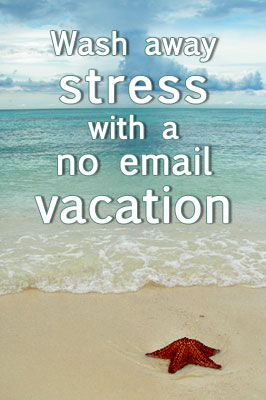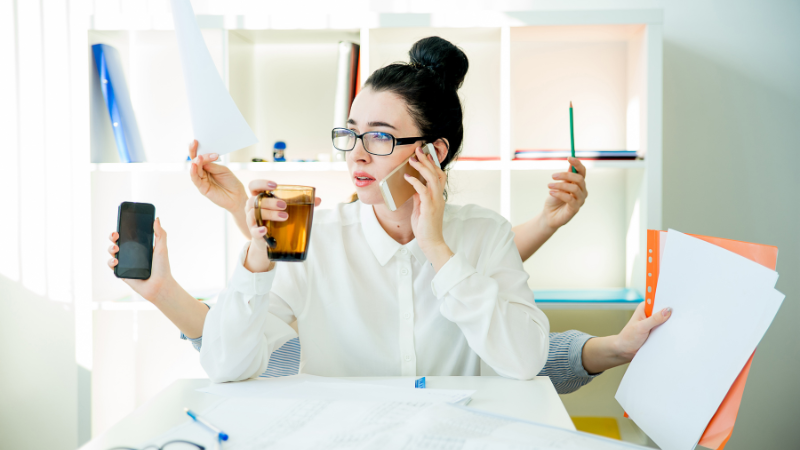I like to think it wasn’t that long ago when the phone used to ring “lonely in the house” as Louis CK puts it. I realize now that as a teenager I must have missed calls. Imagine that! If I was sick at school I went to the nurse and waited there until my mom came home and happened to answer the phone. Today parents can be reached while navigating traffic on a 12-lane interstate at 70 mph and surfing their iTunes playlist.
Welcome, ladies and gentlemen, to multi-tasking in the 21st century!
But neuroscientists are concerned; our nervous system isn’t ‘in sync” with the constant interruptions, and experts can’t predict the long-term effects of being on call 24/7. The evidence we do have though, is a clarion call to reevaluate our response to the demands of technology.
Multi-tasking less effective than we think
For starters, multi-tasking has been shown to be far less effective than we think; it takes longer to get it all done and we make more errors in the process. We text while we’re walking down the street (legislation in some states is being considered due to the uptick in pedestrians being hit by cars) at a movie, or even while talking to someone else. In the workplace interruptions from cell phones, texts and co-workers are cutting into not only our efficiency but our creative problem solving ability as well. But nowhere is the high cost of multitasking more evident than in highway safety data where talking on a cell while driving is equivalent to drinking alcohol.
It turns out it could be just as costly when multi-tasking at your desk. Doing too much, too fast, too often is bad for your brain. Multi-tasking drives up stress hormones which act as battery acid on the memory center of the brain. Slowing down with a few deep breaths and focusing on one task at a time keeps us productive and calm, lowers harmful levels of stress hormones called cortisol and can even boost our mood.
A vacation will help in managing stress levels but not if you are still multi-tasking
Easier said than done. Sixty-two percent (62%) of employees today say their workload has increased over the last six months and 53% report their work leaves them tired and overwhelmed. It’s not just a mental thing: workplace stress costs more than $300 billion (that’s right–billion!) each year (according to the American Institute of Stress in New York). Collectively, stressed workers’ health care costs are 46% higher than that of other employees. (And we’ll skip the stats on cardiovascular disease and cancer.)
But consider this: A 20-year investigation found–after adjusting for factors such as age, tension and anger, along with variables like cholesterol, smoking habits, and body mass index–lack of vacations was the primary predictor of heart attack and death. If that wasn’t enough, this next study sent me running to my travel agent: For “middle-aged men increased frequency of annual vacations is associated with a reduction in deaths from any cause. Those who took regular vacations were 20% less likely to die than those who skipped vacations, and 30% less likely to die of heart disease.
 But jet-setting to the Caribbean may not save you if you’re still multi-tasking. All in all it could be one reason why 60% of responders to a USA Today survey report vacations aren’t as rejuvenating as they used to be. This could be because (as reported in a related survey) more than half of U.S. employees will check emails and take phone calls during their vacation. But many of us (self-included) check email multiple times throughout the day without giving it a thought and probably wouldn’t even consider it “multitasking.” That may not be a good thing.
But jet-setting to the Caribbean may not save you if you’re still multi-tasking. All in all it could be one reason why 60% of responders to a USA Today survey report vacations aren’t as rejuvenating as they used to be. This could be because (as reported in a related survey) more than half of U.S. employees will check emails and take phone calls during their vacation. But many of us (self-included) check email multiple times throughout the day without giving it a thought and probably wouldn’t even consider it “multitasking.” That may not be a good thing.
Taking mini “email vacations” can reduce stress levels and boost productivity
A small but intriguing study released by the University of California found checking email regularly reduced productivity and increased stress (as detected by heart rate monitors). The results prompted the authors to suggest that companies batch emails once or twice a day rather than ding-donging employees every few minutes. They also suggest taking “e-mail vacations”. When subjects avoided email over a five-day period stress levels went down.
As a recent guest on talk radio’s “The Weekly Check-Up” I was asked, “Yes or no, do you check email on vacation?” Until this study the answer was “yes.” But as an experiment I left my cell phone home during a recent vacation. On the 19-hour journey by plane, boat, and automobile my husband and I arrived at the Pacific Rim National Park. According to my husband, for seven days when I wasn’t playing in a tidal pool, tracking the flight of bald eagles or a pod of orcas, I was asleep. I slept on benches, curbs, on my husband’s shoulder, and flat out on the pavement at one point. All time I would previously have spent responding to email, I spent sleeping.
I’m not suggesting that you sleep through half your vacation, but for someone who has trouble napping it was a novel experience. And one I chose to bring home with me. Since then I’m making changes to my work life and I’m polling friends, family and clients about how it feels to know someone can reach out and touch you 24/7. While texting helps keep tabs on your teen, what about the implied need to respond to whomever whenever? What are you doing to be in control of technology rather than technology controlling you? Do you feel guilty when not checking? What advice do you have for others? Share your thoughts and comments via email (Br**************@***il.com) and look for your words in our next column.
© Brenda Stockdale. 2012. All rights reserved.




